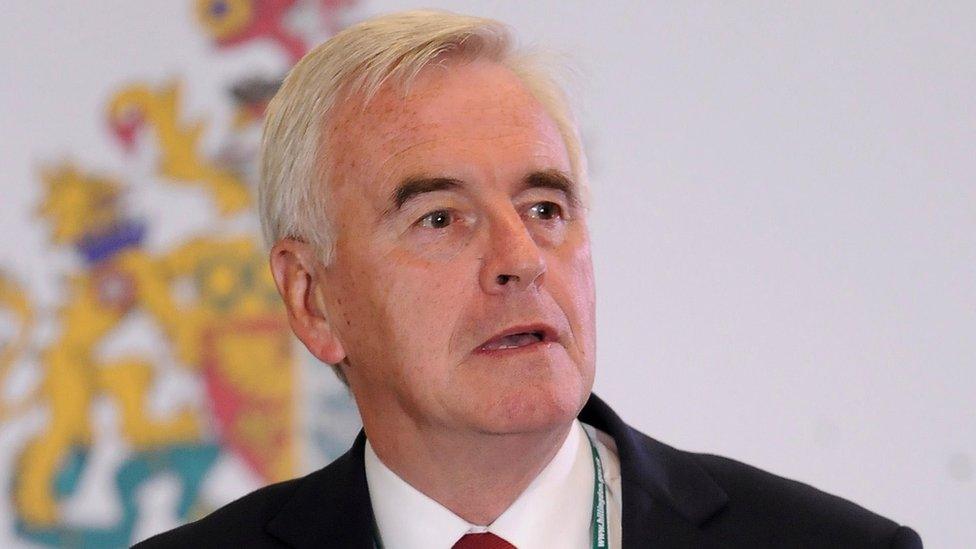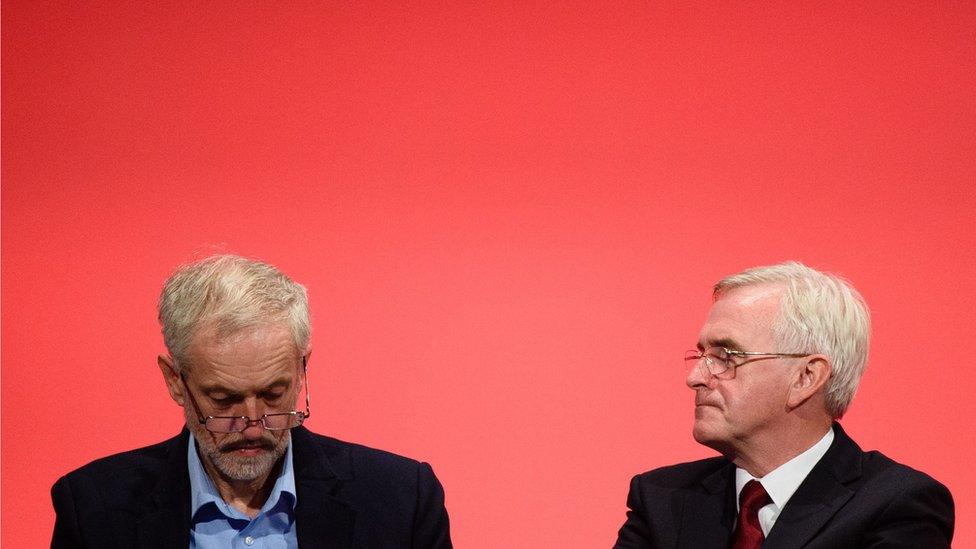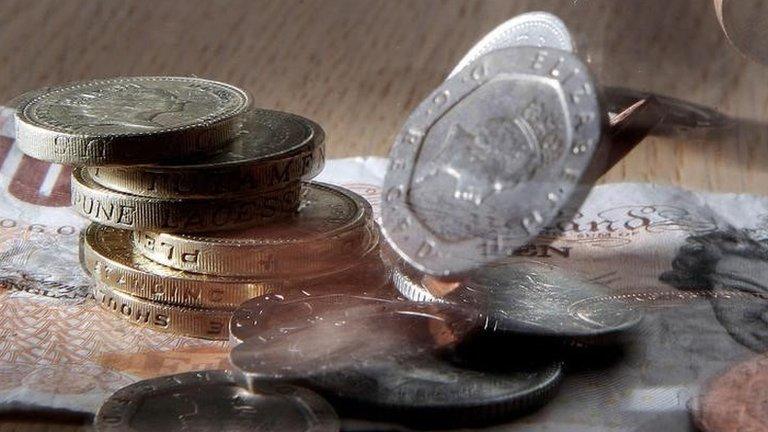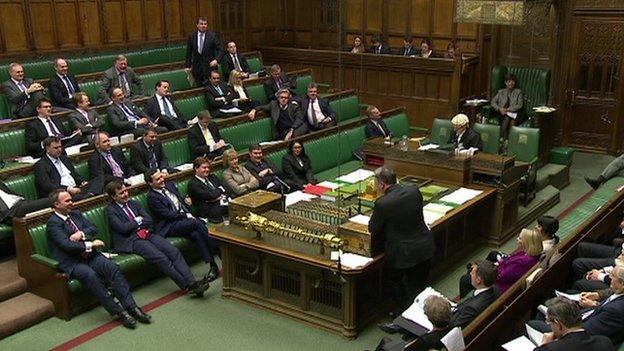John McDonnell: I've changed tactics, not policy on economy
- Published
John McDonnell's changing position - in clips from 28 September and 13 October
John McDonnell has insisted he changed his mind on tactics - not policy - after ditching the party's support for the government's fiscal charter.
The shadow chancellor said Labour would oppose the bid to force future governments to run a budget surplus, having recently said, external it would back it.
The situation was branded a "shambles" after MPs were told about the U-turn at a stormy meeting at Westminster.
Mr McDonnell said Labour would now draw up its own fiscal charter.
He said work on this would start "tomorrow", adding that Labour would create a "new economic paradigm" and was bringing in a "new politics".
"We want people to pay their way but not in terms of income tax. We think people are taxed enough - ordinary low and middle earners - it will be the corporations who should pay their way," he said.
Asked why he had U-turned on supporting Chancellor George Osborne's bill - which commits future governments to balance their budget each year - he said that a trip to meet those hit by the Redcar steelworks closure had prompted the change of mind.
He said that as a result he did not want Labour associated "in any way" with the austerity policies of the government.

Austerity battle
George Osborne became chancellor in 2010, pledging to tackle the UK's deficit and debt (here Norman Smith explains the difference).
The coalition government made major spending cuts - known as "austerity" - from 2010-15.
Further cuts were announced after the Conservatives won May's election.
Labour's Jeremy Corbyn opposes austerity, saying the Conservatives have imposed a "terrible burden" on Britain's poorest people.

Mr McDonnell said he had changed his mind on parliamentary tactics but denied changing his economic policy. He said they had seen the bill as a "gimmick" so had intended to "ridicule it" by voting for it. He said Labour had also intended to try and amend the bill, but parliamentary processes had stopped them being able to.
Mr McDonnell's interview came after he had to explain the move at a shadow cabinet meeting on Tuesday morning which was described as "more reflective" than the heated meeting of Labour MPs on Monday.
The BBC's Eleanor Garnier said some at that meeting of the Parliamentary Labour Party had reacted in fury at the decision - one which BBC political editor Laura Kuenssberg says, external Mr Corbyn had "no idea" was coming.
Former shadow chancellor Chris Leslie criticised the U-turn and said Labour should set out its own motion.
"To go from one extreme to the other is wrong in economic terms but also it sends the wrong message to the general public as well," Mr Leslie told BBC Radio 4's Today programme.

Analysis by Laura Kuenssberg, BBC political editor
If it's all a political trick why should anyone care? Diane Abbott, the shadow international development secretary tried to laugh off the chaos at the weekly gathering of Labour MPs last night when she was put up to defend the policy today.
Labour's change of heart, withdrawing its support for George Osborne's attempt to make it illegal for governments to spend more than they have, was she argued, nothing more than her party's ongoing commitment to Keynsian economics. And the chancellor's efforts are all a dastardly trap that doesn't matter.
There is a logic to opposing the bill. One senior figure in the party told me this morning, without being able to borrow to invest "there is no Labour economic story".
And for Jeremy Corbyn's anti-austerity message to stick, it was odd that his close colleague John McDonnell had supported the idea in the first place.
The Scottish Labour leader, Kezia Dugdale was among those who argued that position could not stick.

But one of leader Jeremy Corbyn's allies, shadow international development secretary Diane Abbott, said some in the party were "only slowly coming to terms with the fact that Jeremy won" the leadership contest.
She said the row over Mr McDonnell's change of heart was "a process story" and said most of the Parliamentary Labour Party were comfortable with the position being taken.
Diane Abbott MP says the Labour party is "in the right position now" on the vote
"I suspect my colleagues, on reflection, will calm down," she added.
Harriet Harman, who was Labour's interim leader after Ed Miliband stepped down, told LBC radio it was "a very disappointing time for the Labour Party".
She said of the reaction to Mr McDonnell's U-turn: "It's not surprising, bearing in mind that this is the most important issue in terms of public confidence and trust in the Labour Party, that there was some anxiety and concern about us changing our position.
"But", she advised, "we need to get ourselves back on track. We need to be coherent, we need to rebuild confidence in the public because actually the country can do much better than… this government."
'Chaos to incredibility'
MPs will debate and vote on Chancellor George Osborne's Charter for Budget Responsibility on Wednesday.
The charter would legally prevent future governments from spending more than they receive in tax revenue when the economy is growing.
The proposal commits the government to keep debt falling as a share of GDP each year and achieve a budget surplus by 2019-20. Governments will then be required to ensure there is a surplus in "normal times".
John McDonnell, speaking on 28 September: "We will vote for it on the basis that we want to assure people that we will tackle the deficit, we will balance the budget, we will live within our means"
Chancellor George Osborne said Labour's economic policy had "lurched from chaos to incredibility".
"Two weeks ago they said they were going to vote for a surplus - now we know they want to keep on borrowing forever. That would be a grave threat to the economic security of working people," he said.
At the weekend, SNP leader and Scottish First Minister Nicola Sturgeon challenged Labour to join her party in voting against the charter.
Welcoming the U-turn, Angus Robertson, SNP leader at Westminster, said it was "promising" but added it was "disgraceful there has had to be any doubt that the Labour Party would oppose Tory cuts".
He said the vote would be a major test for Jeremy Corbyn's leadership, claiming Labour's credibility "would be in ruins" unless every one of its MPs voted against the charter.
The independent Office for Budget Responsibility would be responsible for policing the new rules.
It would also have the power to decide when the government should be able to spend more than it is taking in revenue - for example, when the country is in a recession.
- Published26 September 2015

- Published14 October 2015

- Published10 June 2015

- Published13 January 2015
